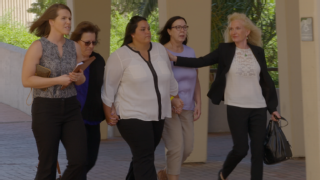|
TUCSON, Ariz. -- Craig Carter, a former assistant track and field coach for the University of Arizona who choked and threatened a former athlete with a box cutter, was sentenced Monday to five years in prison. Carter, 50, was convicted in March of aggravated assault and assault with a dangerous weapon for his April 2015 attack on former Wildcats discus thrower and shot-putter Baillie Gibson. Carter spoke through tears on Monday as he told Pima County (Arizona) Superior Court Judge Teresa Godoy that he was "truly sorry" and that he "hopes and prays" Gibson can forgive him. Gibson also testified at the sentencing hearing. "My life has been shattered because of the trust I put into Craig and the university," Gibson said. "I wish I didn't have to think about any of this because it hurts so much. No matter how hard I try I can't escape it."  On April 20, 2015, during an incident in his track and field office, Carter, who was then the throws coach for the Wildcats, pushed Gibson onto a couch, choked her by placing one hand around her neck and, while holding a box cutter to her face with his other hand, told her he'd cut her face so no man would ever want her. He later confessed to the crime in a videotaped interview with campus police. In a May 2017 interview with ESPN's Outside the Lines, Gibson explained that she walked into Carter's office that day in 2015 to tell him that she would no longer secretly meet him for sex. At the time of the incident, she was a senior, weeks from graduation. Carter had personally recruited Gibson out of her hometown of Casper, Wyoming. During a 2009 meeting with Gibson's parents Carter, a married father of four, told them he'd treat Baillie like his own daughter.  But starting in June 2012, Gibson said, she was coerced and blackmailed by Carter into meeting him for sexual encounters after Carter sexually assaulted her after a house party she attended after the Olympic trials in Eugene, Oregon. For nearly three years, Gibson said, the two met almost weekly for sex in Carter's office, in the Wildcats' track and field training room and while traveling in team hotels. When reached by phone by ESPN, Carter did not deny a sexual relationship with Gibson, even though it represents a clear violation of Arizona's school policy and is punishable by termination. Carter and his lawyers said the former coach never sexually assaulted Gibson in Oregon and that any subsequent encounters between the two were consensual. According to the NCAA's model policy, even consensual coach-athlete relationships "constitute sexual abuse." In November 2013, when a track and field assistant discovered Carter and Gibson in Carter's locked office and grew suspicious that the two were sexually involved, Carter was questioned about his relationship with Gibson by then-athletic director Greg Byrne. During the meeting with Byrne, also attended by head track and field coach Fred Harvey, Carter denied a sexual relationship with Gibson. School records obtained by Outside the Lines revealed that after that meeting, Gibson was never contacted in person by anybody from the University of Arizona. She received two emails from the school's office of institutional equity but, Gibson said, she did not respond because Carter had threatened to kill her if she revealed the sexual encounters. After being questioned by his bosses, Carter continued to coach Gibson and demand sex, Gibson said. "Throughout all of this I became full of shame. Craig forced me to keep my shame a secret. Every day I had to pretend that things were fine," Gibson said at Monday's sentencing hearing. "I felt that was the only way I could protect myself, my family and my career. I feel like I can never get close to anyone because I feel dirty, used and ashamed." In the days following Carter's April 2015 assault on Gibson, she told ESPN, she was reluctant to go to the police out of fear Carter might not be immediately arrested and would retaliate. It was during this period that Carter sent Gibson dozens of threatening emails from his University of Arizona email address. Gibson and her roommate, fellow thrower Julie Labonte, also recorded a phone call with Carter, during which the coach threatened to kill both women. "I know exactly where you're gonna be every day," Carter told Gibson in the recorded phone call. "Don't tell me you're gonna call the cops because when you gonna call them? When I bust through your window with a shotgun loaded coming right at you? You gonna call them real fast? Think they'll get there in time?" Carter was also sentenced Monday to charges relating to his stalking and harassment of Gibson. In the summer of 2015, Carter rejected a plea deal that would have meant serving 3.75 years in prison if he agreed to plead guilty to all charges. Now he'll serve five years. Baillie Gibson still has an outstanding civil lawsuit against Carter, the University of Arizona and its board of regents. A trial date has not yet been set in that case. Records recently obtained by Outside the Lines from the Arizona Department of Administration indicate Carter's Tucson-based civil attorney, John Munger, has been paid more than $930,000 from a public fund as of late March 2018 to defend Carter in that lawsuit. Under Arizona law, the state's Department of Administration is generally obligated to provide counsel for current or former state employees if they face lawsuits for acts within the scope of their employment, according to Megan Rose, a department spokeswoman. Now that Carter has been convicted and sentenced for assaulting Gibson, some Arizona media outlets have questioned whether the state should continue to fund Carter's civil case. When asked how Carter was acting within the "scope of his employment" when he choked Gibson and threatened her with a box-cutter, Rose said, "This is a complex civil case and, as is our practice, we do not comment on pending litigation." The governor's office would not respond to ESPN's request for comment, Rose said. Carter has filed a counter lawsuit against Gibson and her Tucson-based attorney, Lynne Cadigan. As Carter's legal fees approach $1 million, Cadigan questioned the rationale of the state-funded case. "One million dollars to defend a coach in this case is excessive. Every lawyer I've talked to has questioned why the bill is so high. But what's really shocking is that the state of Arizona would rather pay Craig Carter's legal fees instead of resolving the matter with his student victim," Cadigan said Monday. Carter's attorney, Dan Cooper, told the court Monday that Carter has suffered from severe depression for more than 20 years. "He's lost his house. He's lost his job. He's lost literally all of his money. He's lost the respect of the track coaching community," Cooper said of Carter. "Throughout all of this Craig has been remorseful. This is a broken man." Monday's sentencing meant some closure for Gibson but, she said, the psychological toll of her time in Arizona and the impact it had on her sense of personal security remains a daily struggle. She told the court she still has nightmares and panic attacks. "There are many days when I would rather die than continue to feel as if is someone is watching me, following me and wanting to kill me or my family," Gibson said. In his statement Carter insisted upon his release that he would no longer be a threat. "I just want them to know, her and her family to know, that they'll never have to worry about me ever again, that I'm truly sorry," Carter said.
|
